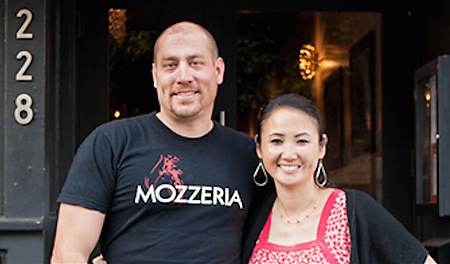Deaf Life13th April 2015
Deaf Restauranteurs Thrive Through Approach To Communication
Launching a Deaf run pizza restaurant - Mozzeria in San Francisco - the Stein's appeal to hearing and deaf guests

At its launch in 2011, many people would have argued against the survival of Mozzeria, another pizza restaurant, in San Francisco. But survive it has, Mozzeria proving that the Deaf owners, Melody and Russell Stein have developed something in using Deaf staff that appeals to the wider San Francisco community.

Coming from a family of restauranteurs, Melody’s family own restaurants in Hong Kong and San Farncisco, and being in and around the restaurants most of her life, she always held an ambition to own her own restaurant.
Second generation Deaf, Russell is from New York and it is his love of pizza that influenced their decision on the type of restaurant to go for. “Russ is from New York and is a big fan of NY pizza,” Melody explained, “So I compromised with Neapolitan pizza.”
 However, putting her restaurant dreams on hold, the Steins followed Russell’s work to South Dakota where he had secured a job with the not for profit Deaf organisation - Communication Service for the Deaf. They lived there for 10 years before returning to the Bay Area, where Melody had grown up. Deciding that their dreams could not be put on hold any longer, the couple starting making their plans. Melody travelled to Italy where, using her mother as her interpreter, she took some pizza and pasta making classes in Rome, Sorrento and Positano, and bought the famous wood-fired Stefano Ferrara oven in Naples.
However, putting her restaurant dreams on hold, the Steins followed Russell’s work to South Dakota where he had secured a job with the not for profit Deaf organisation - Communication Service for the Deaf. They lived there for 10 years before returning to the Bay Area, where Melody had grown up. Deciding that their dreams could not be put on hold any longer, the couple starting making their plans. Melody travelled to Italy where, using her mother as her interpreter, she took some pizza and pasta making classes in Rome, Sorrento and Positano, and bought the famous wood-fired Stefano Ferrara oven in Naples.
 With Russell’s seal of approval on the quality of the pizzas, the green light was given and their dreams started to become a reality. Russell took on the role of managing the building of the restaurant, hiring Deaf workers whenever the could, including the commissioning of artwork from Deaf artists, including one 16 year old high school student.
With Russell’s seal of approval on the quality of the pizzas, the green light was given and their dreams started to become a reality. Russell took on the role of managing the building of the restaurant, hiring Deaf workers whenever the could, including the commissioning of artwork from Deaf artists, including one 16 year old high school student.
As critical to the building of the restaurant were the plans to run a Deaf owned, Deaf run establishment that was as accessible to the hearing community as it was to the Deaf signing community. In many respects, that planning and thought about the communication needs of their hearing guests has been central to their success.
 Four years on, the Stein’s still employ only Deaf staff, 12 of them, with the customer experience being of central importance to everyone who works at the restaurant, whether that is in the quality of the food or the standard of the service. “It’s been quite a journey,” Russell said. “We all work hard to provide the best experience possible to our customers.”
Four years on, the Stein’s still employ only Deaf staff, 12 of them, with the customer experience being of central importance to everyone who works at the restaurant, whether that is in the quality of the food or the standard of the service. “It’s been quite a journey,” Russell said. “We all work hard to provide the best experience possible to our customers.”
What is even more remarkable is that many of the Deaf workers at the restaurant were hired despite them having little or no experience, but giving them opportunities that were not available elsewhere, was important to the Stein’s. “Employing Deaf people shows people that everyone should be given opportunities,” Melody told me, “even if they have not had any formal training and they should be recognised for their hard work and newly found skills.”
 Asking Melody to explain a typical experience for hearing guests, her comments will chime with any seasoned travellers to foreign climbs. “When you visit a non-English speaking country” she said, “you would be handed a restaurant menu in its language. You would most likely point to specific menu items that you want to order, and perhaps write on paper. This process is the same at Mozzeria. Ninety percent of our clientele base is hearing. We write and use gestures with our customers. With some guests, we even teach them the signs.”
Asking Melody to explain a typical experience for hearing guests, her comments will chime with any seasoned travellers to foreign climbs. “When you visit a non-English speaking country” she said, “you would be handed a restaurant menu in its language. You would most likely point to specific menu items that you want to order, and perhaps write on paper. This process is the same at Mozzeria. Ninety percent of our clientele base is hearing. We write and use gestures with our customers. With some guests, we even teach them the signs.”
 With a unique business model, Mozzeria is proof of what can be achieved if the right planning and delivery goes into service delivery. Of course, high quality food matters too, and it is not uncommon to read food reviews of the restaurant that strongly endorse the cooking and the range of the menu. For Melody, this means that they are able to, “bridge all communities and share our culture and language through food.”
With a unique business model, Mozzeria is proof of what can be achieved if the right planning and delivery goes into service delivery. Of course, high quality food matters too, and it is not uncommon to read food reviews of the restaurant that strongly endorse the cooking and the range of the menu. For Melody, this means that they are able to, “bridge all communities and share our culture and language through food.”
Like my own Deaf Friendly business, being Deaf owned and Deaf run means that pre-judgements are often made about the staff and what they are able to achieve. Melody faces this business challenge with great warmth and humility, “Ignorance is to be expected but all we hope that our hearing customers will educate others. All I ask is that every customer enters Mozzeria with an open mind, open heart, and an open stomach.”

Typical of Deaf entrepreneurs over the years, the Steins are constantly looking to solve the problems Deaf people face, and in running a restaurant, lines of communication are one of the focal points of the business. When it first opened, 50% of the calls to the restaurant were missed, meaning that they were losing too many customer reservations. At the time, Mozzeria was using a video relay service (VRS) - a video system where an interpreter acts as a relay communicator between the Deaf and hearing parties to the call. The VRS indicated an incoming call with a large blinking light behind the cash register, but this was both ineffective and the light was found to be distracting to customers.
Looking to solve that problem, the Steins have now installed a system from Convo, a deaf-owned company that's uses also uses light to notify a call but in a more effective and visually pleasing way. Strips of lights are hidden throughout the restaurant with the lights pulsing different colours to indicate different things. For example, a green light indicates a live call, a red one signals a missed call, and a light turning pink to soft purple means a just-missed call. The lights can also pulse to whatever music is playing.

Problem-solving with the Deaf owners at Convo have meant that 95% of the phone calls to the restaurant are now answered. Of course, being Deaf-owner, other ‘deaf-friendly’ lines of communication, used widely amongst the Deaf community, are also available to customers to use to make reservations.
Whilst the majority of customers are hearing, Mozzeria also attracts a lot of Deaf customers, not least because the California School of the Deaf is based in nearby Fremont. Maintaining their commitment to employ Deaf staff, and showing great understanding and support to Deaf signing communities, but with their intention to attract a wide customer base, I asked Melody what it means to them to have a successful restaurant business. “There are many definitions of ‘successful’, she told me. “We succeeded in accomplishing our "seemingly impossible" dream when we launched Mozzeria in December 2011. We were able to create jobs within the Deaf community and all our employees have stayed with us for a long time.”

Deaf friends have visited Mozzeria, a name that comes from Russell’s love of mozzarella cheese, and their feedback has been glowingly positive. A pizza lover myself, if I get the chance to visit the US one day soon, I will try and make sure my plans cover a visit to San Francisco so that I can try one of Melody’s traditional Neapolitan style delights.

If this customer experience is typical, I am sure you will want to join me in visiting, "I have lived in San Francisco for 65 years and have eaten pizza all over the world. Pizza I had last night was best ever tasted!!! The ASL communication going on was an treat for this very rusty signer..." Larry Siegel.
Article by Sarah Lawrence
posted in Community / Deaf Life
13th April 2015





